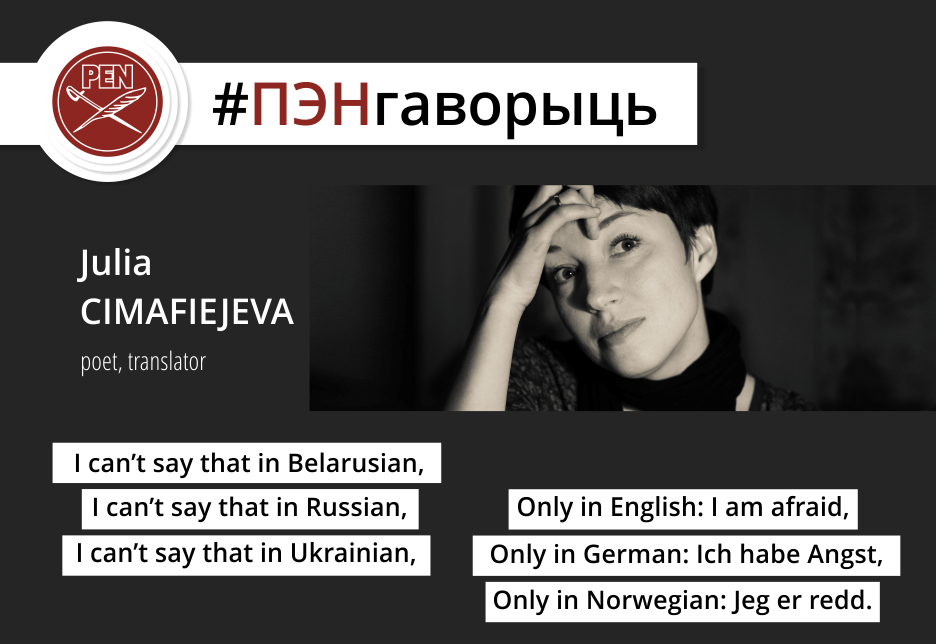
My European Poem
This poem should be written in English.
This poem should be written in German.
This poem should be written in French,
In Swedish, in Spanish, in my adorable Norwegian,
Maybe in Finnish, Danish and Dutch.
Baltic languages should decide for themselves.
No Belarusian version for the poem,
No Russian version for the poem,
No Ukrainian version for the poem,
The rest are at your choice.
This poem should be written in the languages
Of human rights organizations,
Of those multiple expressed concerns
by European politicians.
So
Shall I get used to the thought
That I could be taken to prison
By the men wearing black,
By the men in plain clothes,
By the men with four fat letters
On their fat black backs?
Otherwise, my country
Won’t gain any freedom.
And it could not work anyways,
As usual.
Shall I take it calmly that I
Could be beaten and ultimately
found guilty for that because
(They would say)
I cried antistate slogans like “Freedom!”
Or “Release all political prisoners!”
Though I would not need to cry them out at all
(Like my Facebook friends and thousands of
Someone else’s friends)
In order to be arrested or beaten.
I won’t have to cry anything,
I won’t have to do anything,
Just stand silently, just be.
I know I have to get used to that thought
Just in case, because it’s so likely to happen.
(Oh, my! I haven’t saved those telephones yet
Whom to contact in case of detention. )
I can’t say that in Belarusian,
I can’t say that in Russian,
I can’t say that in Ukrainian,
Only in English: I am afraid,
Only in German: Ich habe Angst,
Only in Norwegian: Jeg er redd.
That’s enough, for other variants,
Please, use Google translate.
The translations should be more
Or less accurate. These are not
Those strange East European languages
With their funny Cyrillic letters.
I’m afraid
Like you would be in my place,
If you lived in a country that is not free
Where they’ve had the same president
For 26 (!) years. Oh, my god! more than
Two thirds of my life I’ve spent
Under the power of a crazy person
Whom I’ve never voted for!
(I can’t say that in Belarusian.)
But my parents did.
All the time they voted for him,
All six times, and I think
They’ll do that for the seventh,
I’m just afraid to ask. Once
a young daring girl, I got a slap
on the face from my mom
for not being “patriotic” enough.
And my dad used to be a local
election commission member.
I’m afraid to ask whether he was honest
While counting the votes,
I am not sure.
Thank God, he is on pension
Now, but the rules there
Are still the same.
I can’t say it in Belarusian,
I can’t say it in Russian.
Sorry, it’s a long poem,
Because it’s a long story,
I spent more than two thirds of my life
Under the power of the man
I’ve never voted for,
Who harassed and suppressed and killed
(they say).
And when I come to the literary festivals abroad,
And when I speak English
I try to tell the complicated history of my country
(When I am asked)
As if I am another person,
As if I am like all those multiple European poets and writers,
Who do not have to get used to the thought
That they could be arrested and beaten
For the sake of their country’s freedom.
As if I my ugly history is just a harsh story
That I can easily put out from the Anthology of
Modern European short stories because
It’s too long,
And too dull.
When I tell it in English,
I want to pretend that I am you,
That I don’t have that painful experience
Of constant protesting and constant failing,
That nasty feeling of frustration and dismay.
I want to pretend that I have a hope,
Because when I tell it in Belarusian
I realize, we all realize, there is none
We can look forward to.
So forgive me my nagging in a half-broken English,
My Eastern European neverending complaints,
As having read the books you’ve read,
I still want to have a hope,
I still believe I have a right for a hope,
That hope could build its nest
On my roof and sing its songs
In Belarusian
(Not in Russian).
